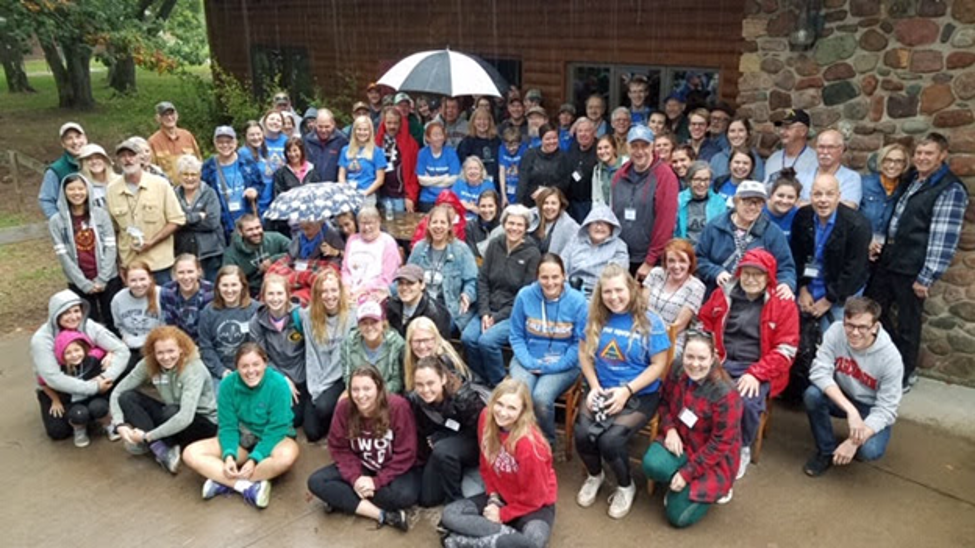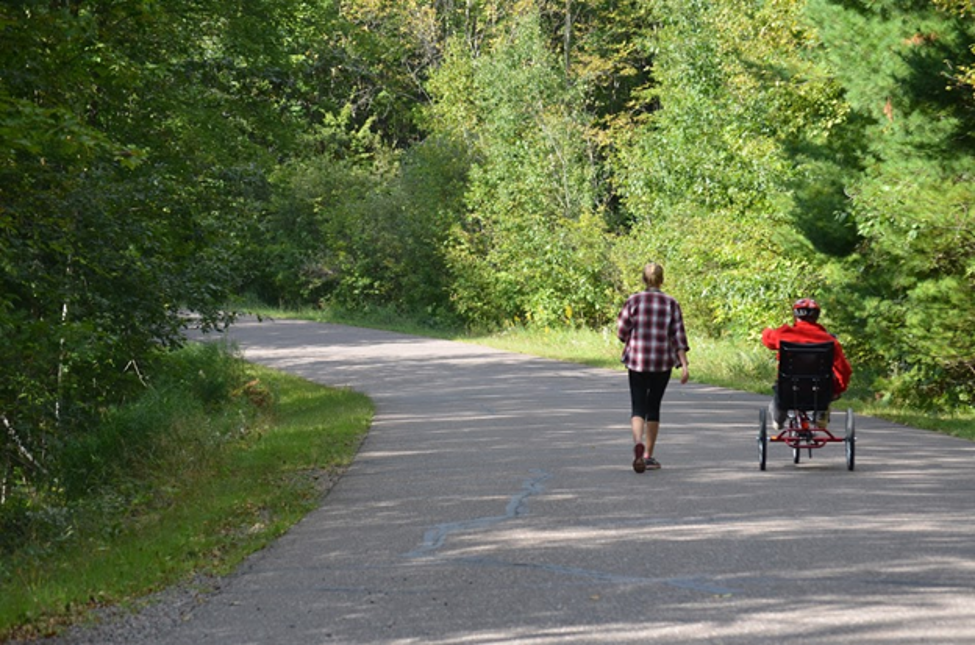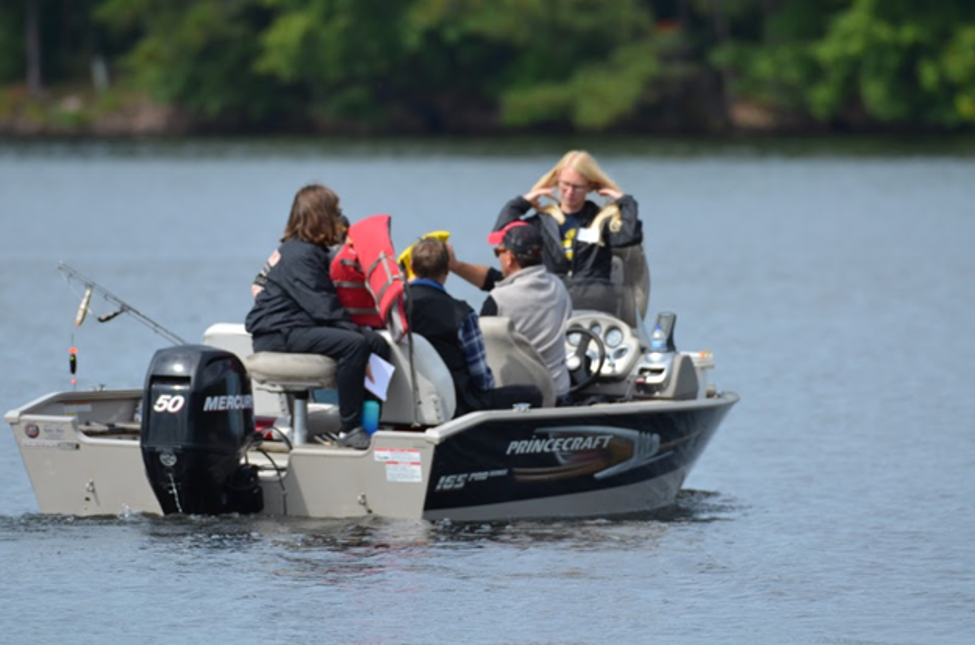Member Spotlight: Jerry Hoepner, PhD, CCC-SLP & Tom Sather, PhD, CCC-SLP

Jerry Hoepner, PhD, CCC-SLP & Tom Sather, PhD, CCC-SLP
University of Wisconsin - Eau Claire
Together with their colleague, Mary Beth Clark, MS, CCC-SLP, rehab director at Mayo Clinic Health System - Eau Claire, Jerry & Tom shared some information about the Chippewa Valley Aphasia Camp.
ANCDS: What is the mission of the program?
Jerry Hopener (JH): We wanted to provide a program for people with aphasia that was a bit outside the typical clinical experience, and try to embed the ideas of being outdoors and being in a unique, “non-clinical” environment. We wanted this program to be primarily about participation, relationships, and identity. The formal mission of the Chippewa Valley Aphasia Camp is to offer people with aphasia and their significant others activities and resources to increase social interaction and facilitate communication success. Camp is a collaboration among Mayo Clinic Health System – Eau Claire, the University of Wisconsin – Eau Claire, and the YMCA of the Chippewa Valley. It’s a weekend-long retreat for those with aphasia and their care partners/family. We have a wide range of activities including canoeing, sailing, archery, woodworking, art, crafts, technology, golf, boating, and many others. We have sessions for all campers as well as sessions specifically for those with aphasia only and other sessions for care partners only. Campers are encouraged to stay in the cabins at camp for the weekend.
ANCDS: Where are you located?
JH: The camp is held at a western Wisconsin YMCA camp called Camp Manitou in a small town about an hour north of Eau Claire, WI.
ANCDS: How long have you been running the camp?
JH: Since 2004 - September of 2020 will be our 17th annual aphasia camp!
ANCDS: How did the camp come about? How did the idea start?
JH: There has been a core group of SLP staff involved in the camp since its inception, and three of us that were part of that core staff are still involved to this day, now joined by Michele Knutson and Carin Keyes. The original idea came about as part of a conversation among Tom Hintgen, Mary Beth Clark, Tom Sather, and myself, who had been co-facilitating LPAA aphasia groups since 1997. When Mary Beth shared her vision for a camp, in 2003, for persons affected by aphasia we all jumped on board. Mary Beth had been a camp counselor for many years at the very same YMCA youth camp where aphasia camp is now hosted. Prior to our camp, we were fortunate to learn from the original aphasia camp innovator, Lynn Fox, who had already started an aphasia camp on the west coast. Knowing the value of camps for building confidence and collaboration in a safe, supportive setting was at the heart of our motivation. We knew at the outset that there was a tremendous, unmet need. As we gathered support from our respective institutions, MCHS-EC and UWEC, we gained momentum and commitment to the program.
ANCDS: Share a success story from the camp.
JH: One of the successes we think about is the broad, holistic success of the camp as a gathering place to support conversation, relationships, activity, and socializing. We think about the “aerial view” of camp at any one time...where we have 25 people with aphasia, 20-ish care partners and family, 20-25 students, and additional SLPs, camp staff, other disciplines, all together in this space. Everyone’s engaged in something that’s meaningful to them at this beautiful northwoods camp along the lake. Coffee and conversations, campfires, archery, yoga, cooking and so on. The interactions, relationships, supports and activity are truly a success. There’s a sense of affiliation to this camp experience - a common bond and shared common experiences, and that bond grows with each shared activity, each day, and with each year, and there’s an identity that has emerged as camp participants -- both staff and campers alike.
There are other successes on a more individual level. We often do art sessions at camp, and one year, on the 4-hour drive back home, a husband/wife couple stopped at an art supply store and bought art supplies so that the individual with aphasia could continue working on the art projects she had done at camp.
Another success has been the evolving role of session leaders at camp. We have intentionally put more emphasis on campers leading sessions — to push them and challenge them, but also because they are experts in a wide range of activities — woodworking, art, crafts, cooking, etc. Those authentic opportunities to lead and engage in these sessions is truly a success of the camp.
ANCDS: What have you learned from the experience of setting up/running the camp?
JH: Camp is a great opportunity to apply participation-based principles, and a great way to implement and support the principles of the Life Participation Approach to Aphasia. We’ve learned that there truly is something about the camp environment — “the place.” It’s secluded, peaceful and immersed in nature. We’re all removed from the usual daily distractions, and we’re all just focused on the camp experience — staff and campers alike. There’s something peaceful, rejuvenating, and organic about that type of experience.
We’ve also learned that there is tremendous value in the residential component of camp — nearly all the campers and staff stay in the cabins on the camp property, and are up at camp from Friday morning until Sunday afternoon. Thus we’re all immersed in the experience together — and we see each other, and communicate, and interact, at the more regular times. We also have these really valuable, touchpoints at camp — like having a conversation as the campfire winds down, or early in the morning on the way to the camp bathrooms, or having a cup of coffee together during down time. Those unique moments in time are natural, authentic communication opportunities.
Partnerships definitely matter to make the camp as effective as possible. We’re very fortunate to have some really stellar partners such as Mayo Clinic Health System, the University of Wisconsin Eau Claire, and also many area businesses who generously and regularly donate supplies and materials. As a result too, it’s another way of getting the word out about aphasia. We have conversations with these vendors, send thank you notes with pictures from camp, etc. and these interactions generate awareness about aphasia, in addition to truly being instrumental to the camp happening. We talk often of a “ripple effect.” One year we may have a person come up and help drive a pontoon boat, or donate some materials, or lead a session. They often express a strong desire to come back up next year and help out, and they offer up their networks as well — of friends, colleagues and other resources. This happens repeatedly year in and year out. Thus we have this “ripple effect” in the community about aphasia and about aphasia camp.
As we’ve worked together over the years at camp, we try to tweak, improve and modify the camp to enhance the camp experience. One thing we’re realizing is that, while we have many structured activities, there’s tremendous benefit in the down time, the unstructured time, and the opportunities during those times for relaxation, spontaneous conversations, and interactions.
And lastly, we’d all agree that there’s really not much better place to be than around a campfire with a group of kind, wonderful people.

ANCDS: How does the camp support people with neurogenic communication disorders and their families?
JH: In a broad sense, we feel that aphasia camp, and the aphasia camp model, addresses fundamental aspects of aphasia services — social interaction, participation, engagement. It involves the individual with aphasia as well as their family/care partners as well. It’s participation-based, with supports to challenge, but also to support participation for all of the campers regardless of physical limitations, communication status, etc. At camp, supported communication supports are present throughout — paper/pens, aphasia-friendly signage, etc. all support camp as an aphasia-friendly environment.
We know that relationships, from distant or causal relationships, to intimate relationships, are impacted by aphasia. Camp has a relationship focus of bringing people together; for the day, weekend; and for the coming years. There’s opportunities for peer-to-peer interactions — spouses supporting spouses, people with aphasia supporting people with aphasia. And many of those interactions and opportunities springboard beyond camp and continue well after the camp weekend.
There’s a prevailing them of “Accessibility” - physically accessible, communicatively accessible, socially accessible, financially accessible. And we strive to make this accessibility be somewhat transparent. It’s the microcosm of the aphasia-friendly environment where supports are proactively in place. We hope that the aphasia becomes more transparent at camp — everyone has it, everyone knows about it, and thus people don’t stand out because of aphasia.
ANCDS: What recommendations would you have for clinicians who are interested in doing innovative programming like the camp?
JH: We have a couple thoughts on that — and we’re always glad to talk more about camp if anyone wants to reach out. But first we think it’s important to establish and be clear on, your therapeutic intent/principles/philosophy that’s guiding the camp you’re developing. We are very clear that the goals are participation and relationships, this isn’t a camp of ‘traditional’ or ‘impairment based’ services. But it could be a range of philosophies or intents of the camp you run, but it’s important to be intentional about that.
Consider also your scope in terms of the size and endeavor of the event. Consider your own capacity and resources. It’s more than fine to start small rather than dive into a big weekend or week-long camp. Start small, jump in; find a good group of colleagues, and begin to grow your camp concept. Apply the principles you believe to be important in whatever your capacity is. It doesn’t have to be a monumental endeavor.
Consider also your Partnerships, who will help you out from a resource standpoint: physical, financial, time, human, etc. Find partners that align with the camp principles or intents, and develop, grow and utilize your community networks. It’s great when you can involve students as that is both a massively rewarding and enlightening experience for students, and also students and academic centers can provide tremendous amounts of resources.
Camp frameworks are great to empower and collaborate with people with aphasia and their families. We include at least one person with aphasia and one family member on our planning board, and we’ve been increasing camp responsibilities for campers as well. It’s a great environment for genuine, real tasks — whether it be in planning or in contributing to sessions, leading sessions, etc.
Lastly, we encourage people to think about the importance of the place — a setting that’s conducive to authentic participation and interactions. Residential options are great as well, where people are together, within a contained environment for the duration of the camp.
ANCDS: What is next for the camp?
JH: We’re always thinking about what’s next and what’s new for upcoming camps. We have ideas about a multi-generational family camp where everyone from grandparents to grandkids can be a part of the camp. We have ideas about expanding the outdoor excursion part of camp, and adding a separate ‘adventure camp’ which would include, for example an overnight canoe trip, or overnight hiking/camping trip. We do our camp in the fall, but we love the idea of a winter camp too. And we do want to continue to refine our outcomes measures and quality measures of the experience (including impact on participation outside of camp), but being mindful of doing that in a way that does not detract from the camp experience.
ANCDS: How does the camp support student learning and interprofessional education?
JH: We feel it is a fantastic opportunity to become immersed in interactions with other students and professionals, and that camp provides a unique way to better understand the lived experience of aphasia across all disciplines and from student through master clinician. We typically have 20–25 undergraduate and graduate students each year. The majority are in the residential Communication Sciences and Disorders program at UWEC, but we also have online students who participate in person, often flying in for the weekend. We also have students from kinesiology, social work, occupational therapy, and computer science. In addition to SLPs, we have many inter-professional staff members including occupational and physical therapists, chaplaincy, social work, adult learning, artists, psychologists, physicians, counselors, and nurses.
Student volunteers go through three modules of training in preparation for camp, staggered across the three months prior to camp. There are both face-to-face and online modules to complete, in addition to debriefing and journaling at camp. We incorporate individuals with aphasia who assist with the training curriculum.

